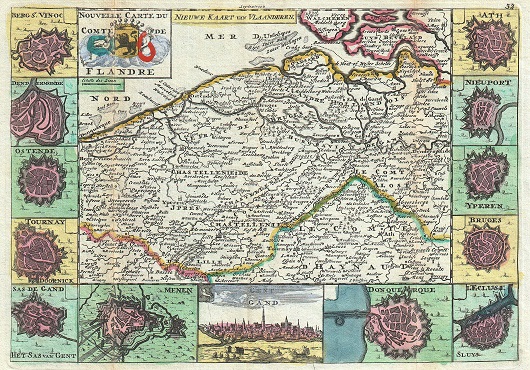Scotland and Flanders trace shared heritage

While immigration continues to dominate much EU referendum debate, an international conference being hosted this week (16 and 17 June 2016) by the University of St Andrews reminds us that immigration is not a new phenomenon.
Taking as its subject Scotland and the Flemish People, the conference, supported by the government of Flanders, studies the influence of Flemish migration to Scotland from 1100 to 1700, including the origin of many Scottish names.
For example not only can tennis pro Andy Murray’s name be shown to have Flemish links, the game itself may have come from Flanders, in the form of a game known as caetsspel.
Flanders, part of modern Belgium, was the most populous as well as the richest area in Northern Europe in the middle ages, and many Flemings migrated to other countries, including Scotland, where they put down deep and enduring roots. The surname Fleming is the most obvious evidence of this, but a range of other families – from Baird to Waddell – have laid claim to Flemish ancestry.
Scotland also maintained strong commercial, cultural and diplomatic links with Flanders throughout the middle ages, exporting wool for the Flemish textile industry, and importing luxury goods – books, paintings and armour – and possibly even such quintessentially Scottish sports as curling and golf.
Drawing on research in history, art history, archaeology, material culture and genealogy, the conference will investigate the migration and settlement of Flemings in Scotland, the commercial and diplomatic relations between Flanders and Scotland, and the range of connections, from family origins to the game of golf, that are continuing testimony to their historic links.
Conference organiser Professor Roger Mason of the Institute of Scottish Historical Research said: “The generous funding of two PhD studentships has allowed us to explore little known aspects of the political and commercial links that bound the independent Scottish kingdom to its European neighbours in the middle ages and the conference gives us the opportunity to showcase this research to an international audience. The links between migration, settlement and economic development in Europe are not just present day concerns, but are deeply rooted in its history.”
The conference will also look at a project that tests the DNA of Scots who think they might have Flemish ancestry. The project, set up by St Andrews graduate and former lecturer Alex Fleming together with Professor Alasdair Macdonald of Strathclyde University in Glasgow, is called Y-DNA. The Y-DNA project looks at inheritance of the Y chromosome, since surnames are passed from father to son. Comparing the results with documented family history, Fleming says it’s possible to see where a Scottish family has a line that traces back to Flanders.
The DNA session will include testimony from some of the families thought to have Flemish roots on their experience with the project. Other sessions will look at diverse questions such as the Flemish influence on Scottish church architecture and the politics, diplomacy and commerce between the two regions, and place-names that may have a Flemish background.
Mr Nic Van Der Marliere, General Representative of the Government of Flanders in the UK, is delighted to be attending the conference and commented: “Since medieval times the unique relationship between Flanders and Scotland has yielded many wonderful contributions to our common history and heritage. Scotland and Flanders: allies in battle, partners in commerce, associates in science, culture and arts. Not to mention the great influence of the Dutch language on Scots. In Flanders we are very proud of our ancient and important links with the Scottish people and I congratulate Professor Roger Mason and his associates, the University of St Andrews and the sponsors for the remarkable work they have accomplished.”
The conference is the culmination of a three-year research project, funded by the P F Charitable Trust and the Wyfold Charitable Trust, and directed by Professor Mason.
Notes to news editors
Visit full conference programme for Scotland and the Flemish People for more information.
Conference organiser Professor Roger Mason of the Institute of Scottish Historical Research is available for interview before 1300 hours. Please contact the Press Office to arrange on 01334 462 167.
Issued by the University of St Andrews press office, contactable on 01334 462 530 or [email protected].
Category Research